
Question Number 2702 by Filup last updated on 25/Nov/15
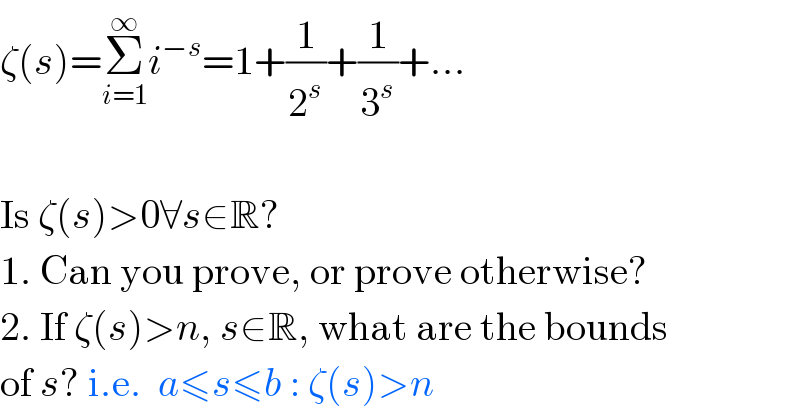
$$\zeta\left({s}\right)=\underset{{i}=\mathrm{1}} {\overset{\infty} {\sum}}{i}^{−{s}} =\mathrm{1}+\frac{\mathrm{1}}{\mathrm{2}^{{s}} }+\frac{\mathrm{1}}{\mathrm{3}^{{s}} }+... \\ $$ $$ \\ $$ $$\mathrm{Is}\:\zeta\left({s}\right)>\mathrm{0}\forall{s}\in\mathbb{R}? \\ $$ $$\mathrm{1}.\:\mathrm{Can}\:\mathrm{you}\:\mathrm{prove},\:\mathrm{or}\:\mathrm{prove}\:\mathrm{otherwise}? \\ $$ $$\mathrm{2}.\:\mathrm{If}\:\zeta\left({s}\right)>{n},\:{s}\in\mathbb{R},\:\mathrm{what}\:\mathrm{are}\:\mathrm{the}\:\mathrm{bounds} \\ $$ $$\mathrm{of}\:{s}?\:\mathrm{i}.\mathrm{e}.\:\:{a}\leqslant{s}\leqslant{b}\::\:\zeta\left({s}\right)>{n} \\ $$
Commented byFilup last updated on 25/Nov/15

$$\mathrm{i}\:\mathrm{have}\:\mathrm{actually}\:\mathrm{solved}\:\mathrm{that}\:\mathrm{ab}{o}\mathrm{ut}\:\mathrm{a}\:\mathrm{week} \\ $$ $$\mathrm{ago}.\:\mathrm{ill}\:\mathrm{post}\:\mathrm{it}\:\mathrm{later} \\ $$ $$\mathrm{I}\:{have}\:{work}\:\mathrm{now} \\ $$ $$ \\ $$ $$\mathrm{i}'\mathrm{ll}\:\mathrm{make}\:\mathrm{a}\:\mathrm{new}\:\mathrm{post}\:\mathrm{later}\:\mathrm{with}\:\mathrm{the}\:\mathrm{proof} \\ $$
Commented byFilup last updated on 25/Nov/15

$$\mathrm{Feel}\:\mathrm{free}\:\mathrm{to}\:\mathrm{express}\:\zeta\left({s}\right)\:\mathrm{in}\:\mathrm{other}\:\mathrm{froms} \\ $$ $$\mathrm{of}\:\mathrm{notation}\:\left({such}\:{as}\:{in}\:{terms}\:{of}\right. \\ $$ $$\left.\Gamma\:{and}\:{integral}\:{notation}\right) \\ $$
Commented byprakash jain last updated on 25/Nov/15
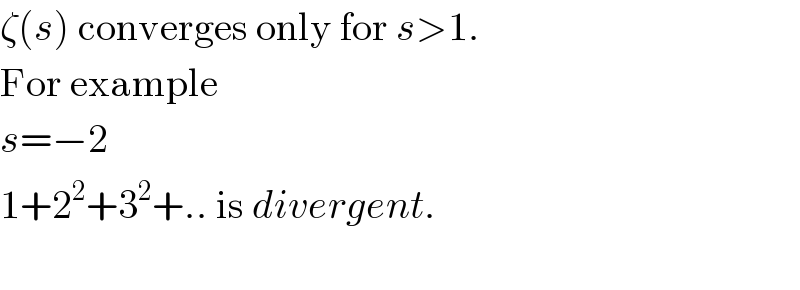
$$\zeta\left({s}\right)\:\mathrm{converges}\:\mathrm{only}\:\mathrm{for}\:{s}>\mathrm{1}. \\ $$ $$\mathrm{For}\:\mathrm{example} \\ $$ $${s}=−\mathrm{2} \\ $$ $$\mathrm{1}+\mathrm{2}^{\mathrm{2}} +\mathrm{3}^{\mathrm{2}} +..\:\mathrm{is}\:{divergent}. \\ $$ $$ \\ $$
Commented by123456 last updated on 25/Nov/15
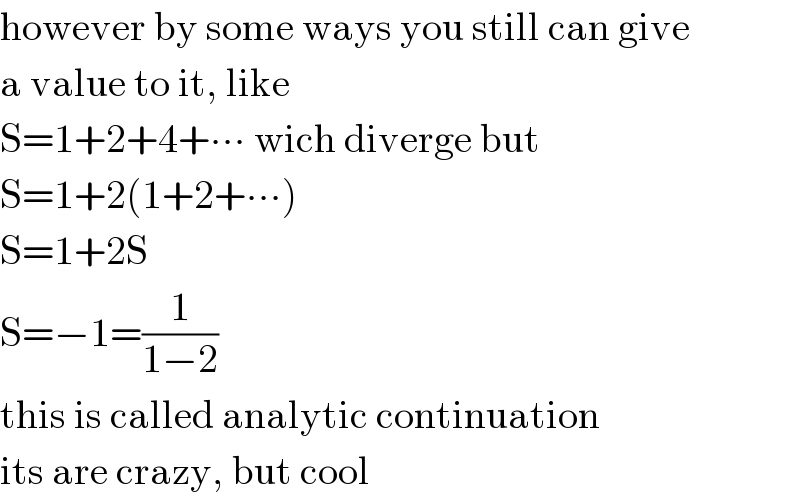
$$\mathrm{however}\:\mathrm{by}\:\mathrm{some}\:\mathrm{ways}\:\mathrm{you}\:\mathrm{still}\:\mathrm{can}\:\mathrm{give} \\ $$ $$\mathrm{a}\:\mathrm{value}\:\mathrm{to}\:\mathrm{it},\:\mathrm{like} \\ $$ $$\mathrm{S}=\mathrm{1}+\mathrm{2}+\mathrm{4}+\centerdot\centerdot\centerdot\:\mathrm{wich}\:\mathrm{diverge}\:\mathrm{but} \\ $$ $$\mathrm{S}=\mathrm{1}+\mathrm{2}\left(\mathrm{1}+\mathrm{2}+\centerdot\centerdot\centerdot\right) \\ $$ $$\mathrm{S}=\mathrm{1}+\mathrm{2S} \\ $$ $$\mathrm{S}=−\mathrm{1}=\frac{\mathrm{1}}{\mathrm{1}−\mathrm{2}} \\ $$ $$\mathrm{this}\:\mathrm{is}\:\mathrm{called}\:\mathrm{analytic}\:\mathrm{continuation} \\ $$ $$\mathrm{its}\:\mathrm{are}\:\mathrm{crazy},\:\mathrm{but}\:\mathrm{cool} \\ $$
Commented byprakash jain last updated on 25/Nov/15

$$\mathrm{Filup}\:\mathrm{has}\:\mathrm{posted}\:\mathrm{some}\:\mathrm{question}\:\mathrm{earlier}\:\mathrm{as} \\ $$ $$\mathrm{well}\:\mathrm{related}\:\mathrm{to}\:\mathrm{that}. \\ $$ $$\underset{{i}=\mathrm{1}} {\overset{\infty} {\sum}}{i}=\frac{−\mathrm{1}}{\mathrm{12}}\:\mathrm{or}\:\zeta\left(−\mathrm{1}\right)=\frac{−\mathrm{1}}{\mathrm{12}} \\ $$ $$ \\ $$ $$\mathrm{I}\:\mathrm{will}\:\mathrm{read}\:\mathrm{more}\:\mathrm{to}\:\mathrm{see}\:\mathrm{what}\:\mathrm{are}\:\mathrm{the}\:\mathrm{possibilities} \\ $$ $$\mathrm{for}\:\zeta\:\mathrm{function},\:\mathrm{for}\:\mathrm{example}\:\zeta\left(−\mathrm{2}\right)=\underset{{i}=\mathrm{1}} {\overset{\infty} {\sum}}{i}^{\mathrm{2}} \\ $$
Commented by123456 last updated on 25/Nov/15
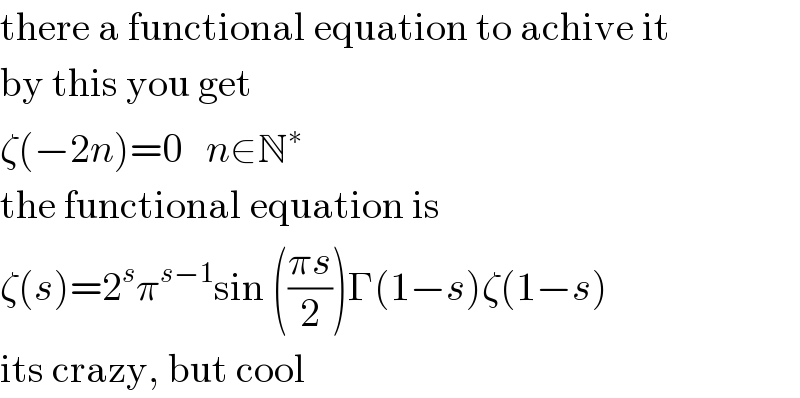
$$\mathrm{there}\:\mathrm{a}\:\mathrm{functional}\:\mathrm{equation}\:\mathrm{to}\:\mathrm{achive}\:\mathrm{it} \\ $$ $$\mathrm{by}\:\mathrm{this}\:\mathrm{you}\:\mathrm{get} \\ $$ $$\zeta\left(−\mathrm{2}{n}\right)=\mathrm{0}\:\:\:{n}\in\mathbb{N}^{\ast} \\ $$ $$\mathrm{the}\:\mathrm{functional}\:\mathrm{equation}\:\mathrm{is} \\ $$ $$\zeta\left({s}\right)=\mathrm{2}^{{s}} \pi^{{s}−\mathrm{1}} \mathrm{sin}\:\left(\frac{\pi{s}}{\mathrm{2}}\right)\Gamma\left(\mathrm{1}−{s}\right)\zeta\left(\mathrm{1}−{s}\right) \\ $$ $$\mathrm{its}\:\mathrm{crazy},\:\mathrm{but}\:\mathrm{cool} \\ $$
Commented byFilup last updated on 26/Nov/15

$$\mathrm{I}\:\mathrm{was}\:\mathrm{incorrect}.\:\mathrm{I}\:\mathrm{have}\:\mathrm{not}\:\mathrm{done}\:\mathrm{the} \\ $$ $$\mathrm{proof}\:\mathrm{I}\:\mathrm{said}\:\mathrm{I}\:\mathrm{did}.\:\mathrm{I}\:\mathrm{mistakenly}\:\mathrm{mixed}\: \\ $$ $$\mathrm{it}\:\mathrm{up}\:\mathrm{with}\:\mathrm{something}\:\mathrm{else}.\:\mathrm{If}\:\mathrm{someone}\:\mathrm{could} \\ $$ $$\mathrm{make}\:\mathrm{a}\:\mathrm{post}\:\mathrm{on}\:\mathrm{how}\:\zeta\left(−\mathrm{2}{n}\right)=\mathrm{0},\:\mathrm{that}'\mathrm{d} \\ $$ $$\mathrm{be}\:\mathrm{awsome} \\ $$
Commented by123456 last updated on 26/Nov/15
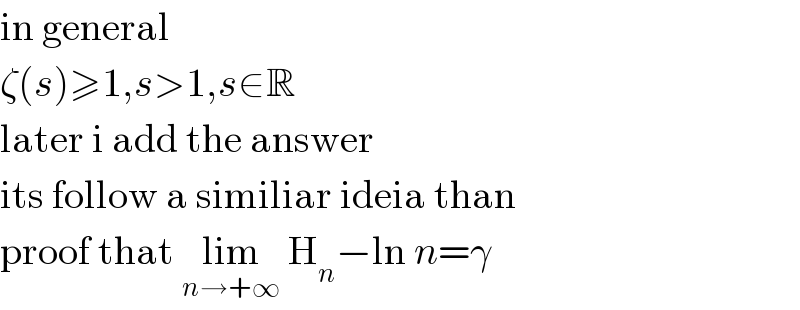
$$\mathrm{in}\:\mathrm{general} \\ $$ $$\zeta\left({s}\right)\geqslant\mathrm{1},{s}>\mathrm{1},{s}\in\mathbb{R} \\ $$ $$\mathrm{later}\:\mathrm{i}\:\mathrm{add}\:\mathrm{the}\:\mathrm{answer} \\ $$ $$\mathrm{its}\:\mathrm{follow}\:\mathrm{a}\:\mathrm{similiar}\:\mathrm{ideia}\:\mathrm{than} \\ $$ $$\mathrm{proof}\:\mathrm{that}\:\underset{{n}\rightarrow+\infty} {\mathrm{lim}}\:\mathrm{H}_{{n}} −\mathrm{ln}\:{n}=\gamma \\ $$
Answered by 123456 last updated on 27/Nov/15

$${x}\geqslant\mathrm{1},{s}>\mathrm{1} \\ $$ $$\underset{\mathrm{1}} {\overset{+\infty} {\int}}\frac{{dx}}{\lceil{x}\rceil^{{s}} }=\underset{{n}=\mathrm{1}} {\overset{+\infty} {\sum}}\frac{\mathrm{1}}{\left({n}+\mathrm{1}\right)^{{s}} } \\ $$ $$\underset{\mathrm{1}} {\overset{+\infty} {\int}}\frac{{dx}}{\lfloor{x}\rfloor^{{s}} }=\underset{{n}=\mathrm{1}} {\overset{+\infty} {\sum}}\frac{\mathrm{1}}{{n}^{{s}} } \\ $$ $$\mathrm{0}<\frac{\mathrm{1}}{\lceil{x}\rceil^{{s}} }\leqslant\frac{\mathrm{1}}{{x}^{{s}} }\leqslant\frac{\mathrm{1}}{\lfloor{x}\rfloor^{{s}} }\:\:\left(=\:\mathrm{only}\:\mathrm{for}\:{x}\in\mathbb{N}^{\ast} \right) \\ $$ $$\mathrm{0}<\underset{\mathrm{1}} {\overset{+\infty} {\int}}\frac{{dx}}{\lceil{x}\rceil^{{s}} }<\underset{\mathrm{1}} {\overset{+\infty} {\int}}\frac{{dx}}{{x}^{{s}} }<\underset{\mathrm{1}} {\overset{+\infty} {\int}}\frac{{dx}}{\lfloor{x}\rfloor^{{s}} } \\ $$ $$\mathrm{0}<\underset{{n}=\mathrm{1}} {\overset{+\infty} {\sum}}\frac{\mathrm{1}}{\left({n}+\mathrm{1}\right)^{{s}} }<\frac{\mathrm{1}}{{s}−\mathrm{1}}<\underset{{n}=\mathrm{1}} {\overset{+\infty} {\sum}}\frac{\mathrm{1}}{{n}^{{s}} } \\ $$ $$\mathrm{1}<\mathrm{1}+\underset{{n}=\mathrm{1}} {\overset{+\infty} {\sum}}\frac{\mathrm{1}}{\left({n}+\mathrm{1}\right)^{{s}} }<\mathrm{1}+\frac{\mathrm{1}}{{s}−\mathrm{1}} \\ $$ $$\mathrm{1}<\underset{{n}=\mathrm{1}} {\overset{+\infty} {\sum}}\frac{\mathrm{1}}{{n}^{{s}} }<\frac{{s}}{{s}−\mathrm{1}} \\ $$ $$\mathrm{so} \\ $$ $$\mathrm{1}<\frac{\mathrm{1}}{{s}−\mathrm{1}}<\zeta\left({s}\right)<\frac{{s}}{{s}−\mathrm{1}}\:\:\:\:\left({s}>\mathrm{1}\right) \\ $$ $${s}\rightarrow+\infty,\zeta\left({s}\right)\rightarrow\mathrm{1} \\ $$ $${s}\rightarrow\mathrm{1}^{+} ,\zeta\left({s}\right)\rightarrow+\infty \\ $$
